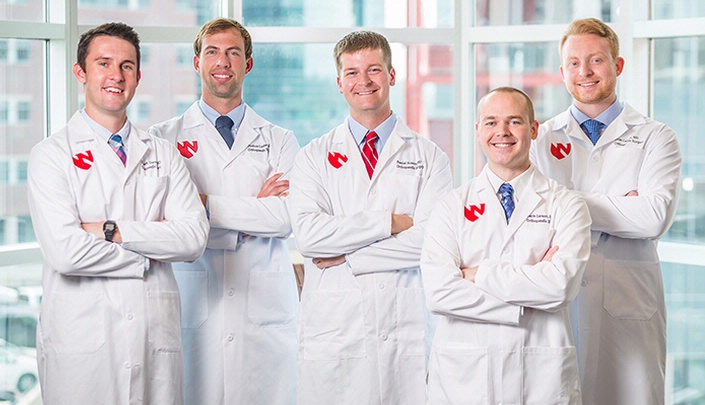The Accreditation Council for Graduate Medical Education (ACGME) accepted the department’s request for an increased number of residents beginning in 2015.
For the first time in 31 years, the UNMC Department of Orthopaedic Surgery and Rehabilitation welcomed five new residents to the program.
Historically, the program has accepted four new residents each year, but as the department’s faculty and research capacity has grown, professor and chair Dr. Kevin Garvin and residency program director Dr. Matthew Mormino decided it was time to make a change.
"Our department has tripled in size over the past 15 years, which has increased the opportunities for resident education," Dr. Mormino said. "That, combined with a national need for more orthopaedic surgeons made this an ideal time to increase our number of resident physicians."
The department currently boasts 16 full-time orthopaedic surgeons and clinician scientists.
Among these physicians are recently-hired faculty members that specialize in hand and upper extremity, sports medicine, trauma, pediatric and spinesurgery. Our roster of dedicated educators offers greater learning opportunities for residents.
"With more and varied surgical cases, our residents will have access to a well-rounded educational experience," Dr. Mormino said.
UNMC orthopaedic residents have the added advantage of a successful research team. A robust research program only enhances residents’ knowledge of the basicscience of orthopaedics, which in turn, teaches them to become lifelong learners and exceptional surgeons.
Similarly, UNMC’s clinical simulation lab, the expansion of Nebraska Medicine’s clinical practices and a 40 percent increase in trauma admissions all provide additional opportunities for residents to have earlier and greater exposure to all facets of orthopaedic surgery.
The increase will have a significant effect on the basic structure of the program. Residents will now be able to spend more time in several subspecialty areas. For example, residents will participate in a newly-formed PGY-2 with a primary focus on orthopaedic oncology and an extra ten weeks of pediatric orthopaedics.
PGY-3 and PGY-4 residents will now spend time at the new sports service at the Nebraska Orthopaedic Hospital. An additional PGY-5 rotation will give residents training in trauma services with the department’s three trauma surgeons.
Orthopaedic faculty have always focused on residents as learners rather than service providers. That belief has propelled the program forward over the past three decades and will continue to do so in the future.
There is no doubt about it: The educational bar for orthopaedic residents has been raised, and the department’s members relish their roles as leading educators.
